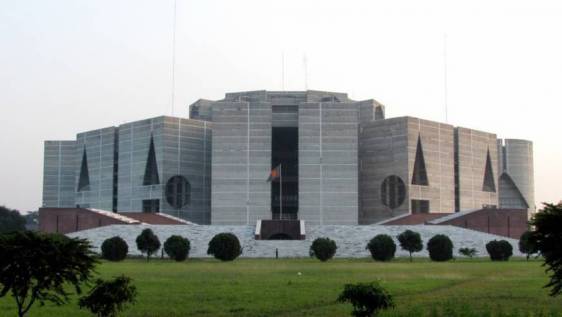Parliament will not be able to impeach a judge without a two-thirds majority vote, says cabinet secretary
The cabinet led by Prime Minister Sheikh Hasina has approved the final draft of the 16th Amendment Act 2014, allowing the restoration of parliament’s authority to impeach Supreme Court judges.
The cabinet passed the final draft in its regular meeting on Monday afternoon, Cabinet Secretary M Musharraf Hossain Bhuiyan said.
Briefing reporters after the meeting, the cabinet secretary said as per the amendment, minimum two-thirds of the total parliament members would be able to impeach any judge for his or her misconduct or incapacity after taking approval of the president.
Bhuiyan said the authority of impeachment was vested in parliament through section 96 of the constitution of 1972 that was formulated upholding the spirit and ideals of the Liberation War, reported BSS.
However, in absence of parliament, the authority was vested in the Supreme Judicial Council by a martial law proclamation in 1978 after the brutal assassination of Father of the Nation Bangabandhu Sheikh Mujibur Rahman.
The proclamation cancelled article 96 of the constitution which is contradictory to the article 7 of the constitution.
In this connection, the Cabinet Secretary said that the neutrality and accuracy of the impeachment decision could be questionable as an accused judge and a member of the Supreme Judicial Council usually work together in the same institution for a long time.
He said according to article 7, the people are the owners of all power of the republic and the enforcement of these powers will be effective only under the constitution.
The cabinet secretary said once the 16th amendment of the constitution was passed in parliament, it could impeach a judge for his or her misconduct or incapability with vote of at least two-thirds members of parliament. The impeachment could not be executed without the order of the president.
He said there were consistencies of article 54, 74 ( ga) and 57(2) with the main provision of article 96 of the constitution of 1972.
Bhuiyan said the president could be impeached through two-thirds of the majority of parliament as per article 54 of the constitution, while the speaker of the parliament could be impeached with simple majority of parliament members, in line with article 74 (ga).
On the other hand, according to 57 (2) article “no-confidence” motion could be adopted against the prime minister with simple majority of the MPs.
According to the existing constitutional provision, the Supreme Judicial Council comprising the chief justice and two other senior most judges of the Appellate Division investigates allegations of misconduct against any judge and makes necessary recommendations to the president.
The president then takes steps as per the suggestions. He can also impeach a judge for having physical and mental incapacity to properly perform the functions of his office.
Source: Dhaka Tribune











MPs are called lawmaker! Of course, the law maker should be able to impeach the government servants who are working for the law. Hope that MPs will be able to impeach/terminate the secretaries in future. We are in right direction.